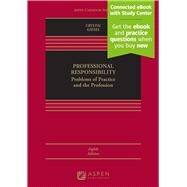Professional Responsibility: Problems of Practice and the Profession, Eighth Edition
, by Nathan M. Crystal; Grace M. Giesel- ISBN: 9798889062936 | 8889062932
- Cover: Hardcover
- Copyright: 2/6/2024
Buy a new version of this textbook and receive access to the Connected eBook with Study Center on Casebook Connect, including lifetime access to the online ebook with highlight, annotation, and search capabilities. Access also includes practice questions, an outline tool, and other helpful resources. Connected eBooks provide what you need most to be successful in your law school classes.
Professional Responsibility: Problems of Practice and the Profession, Eighth Edition, is known for its flexibility and adaptability to different teaching methods and student learning styles. The text is easily adaptable to a variety of teaching methods, including question and answer discussion of text and problems, role play, student presentations, guest speakers, and writing seminars. The book is structured to enable instructors to present the materials doctrinally or by area of practice. The extensive multifaceted problems provide instructors with a wide range of options for presenting the material. The authors have carefully crafted the text so that reading assignments are reasonable – typically 10-15 pages for a one-hour session and 20-25 pages for a two-hour session. The book offers three types of problems, each of which has a specific purpose in the student’s ethical education. The text and principal discussion problems are designed to help students develop the ability to make sound judgments for difficult questions of professional responsibility. Each chapter contains Rule Review questions that present multiple hypotheticals enabling students to understand the scope and limitations of important rules of professional conduct. Multiple-choice assessment questions at the end of each chapter with detailed answers help the students review major concepts in the chapter and prepare for the MPRE.
New to the Eighth Edition:
- Length shortened by almost 200 pages, to focus on the most important ethical issues for two-hour courses, which are now the standard. A number of problems have been moved from the text to the website and are still available for professors who have used them in the past.
- More in-depth discussion of the duty of confidentiality, including comparing the scope of the duty of confidentiality in New York, the District of Columbia, and California with ABA Model Rule 1.6; examining the concepts of use and disclosure; and adding analysis of the “possession exception” to the duty of confidentiality focusing on the lawyer’s decision to take possession of such evidence and the distinction between tangible criminal material and real incriminating evidence.
- Coverage of a number of contemporary issues involving ethics and technology, including ethical propriety of a lawyer responding to on-line criticism and the ethical aspects of a lawyer’s use of artificial intelligence.
- Additional material on the obligations of defense counsel and prosecutors, including defense counsel’s obligations when advising a client regarding a competency defense and new problem material on prosecutors’ ethical obligations under Rule 3.8 dealing with evidence of a wrongful conviction.
- Revised material on delivery of legal services, including new material on removal of restrictions on the unauthorized practice of law, comments on legal services plans and delivery of legal services in criminal cases, and pro bono services offered by law firms.
- Post-2020 ethical issues, including the application of the crime-fraud exception to the attorney-client privilege and issues of frivolous claims in litigation involving the 2020 Presidential election; new material on Justice Department investigation of “pattern and practice” investigations of a number of city police departments; and scrutiny of financial benefits received by Supreme Court Justices.
- Realistic problems that develop students’ ability to make sound judgments.
- Emphasis on guiding students to articulate a cogent philosophy of lawyering.
- Innovative, flexible organization suited to a variety of courses and clinical programs.
- Organized by major doctrinal concepts, such as confidentiality and conflicts of interest.
- Offers alternative organization by area of practice.
- Modular organization for professor choice.
- Manageable length.
- Extensive Teacher’s Manual suggests lessons, sample syllabi (for two- and three-hour classes), Q & A, and role-playing models.
- Multiple-choice assessment questions and answers located at the end of each chapter to prepare students for the MPRE.
- PowerPoint slides dealing with fundamental concepts and the basic problems presented in the book.
- Essay questions with outlines of answers on the course website that instructors can use for class discussion or student review.







